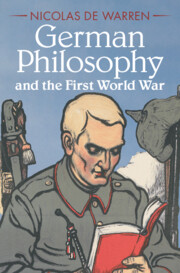Book contents
- German Philosophy and the First World War
- German Philosophy and the First World War
- Copyright page
- Dedication
- Contents
- Acknowledgments
- Introduction
- Chapter 1 The Genius of War, the Genius of Peace
- Chapter 2 Deutschtum und Judentum
- Chapter 3 I and Thou
- Chapter 4 More than Life
- Chapter 5 The Apocalypse of Hope
- Chapter 6 The Road to Damascus in the Age of Capitalism
- Chapter 7 From Death into Life
- Chapter 8 “A Journey around the World”
- Chapter 9 Martin Heidegger and the Titanic Struggle over Being
- Chapter 10 The Tragedy of the Person
- Bibliography
- Index
Chapter 2 - Deutschtum und Judentum
Hermann Cohen in the Time of the Nations
Published online by Cambridge University Press: 30 March 2023
- German Philosophy and the First World War
- German Philosophy and the First World War
- Copyright page
- Dedication
- Contents
- Acknowledgments
- Introduction
- Chapter 1 The Genius of War, the Genius of Peace
- Chapter 2 Deutschtum und Judentum
- Chapter 3 I and Thou
- Chapter 4 More than Life
- Chapter 5 The Apocalypse of Hope
- Chapter 6 The Road to Damascus in the Age of Capitalism
- Chapter 7 From Death into Life
- Chapter 8 “A Journey around the World”
- Chapter 9 Martin Heidegger and the Titanic Struggle over Being
- Chapter 10 The Tragedy of the Person
- Bibliography
- Index
Summary
On many fronts, 1916 marked a point of no return. After the collapse of optimism for swift victory following the outbreak of hostilities, the inconclusive bloodlettings at Verdun and the Somme, and mounting economic hardships on the home front, the prospects for German triumph seemed increasingly dim. Attitudes became more resigned to a war like no other, a war without end. Dampened expectations gave way to creeping pessimism matched by defiant fatalism. A number of prominent intellectuals and academics who in 1914 eagerly supported the war now came to express their doubts or else fell conspicuously silent regarding the fate of the nation. Once the most vocal of advocates for the war, Ernst Troeltsch began to see things differently and came to accept the political deficiencies of the Wilhelmine Empire with its deleterious militarism.
- Type
- Chapter
- Information
- German Philosophy and the First World War , pp. 47 - 82Publisher: Cambridge University PressPrint publication year: 2023

